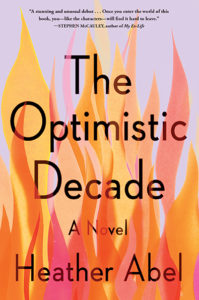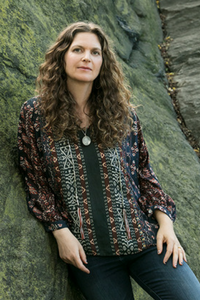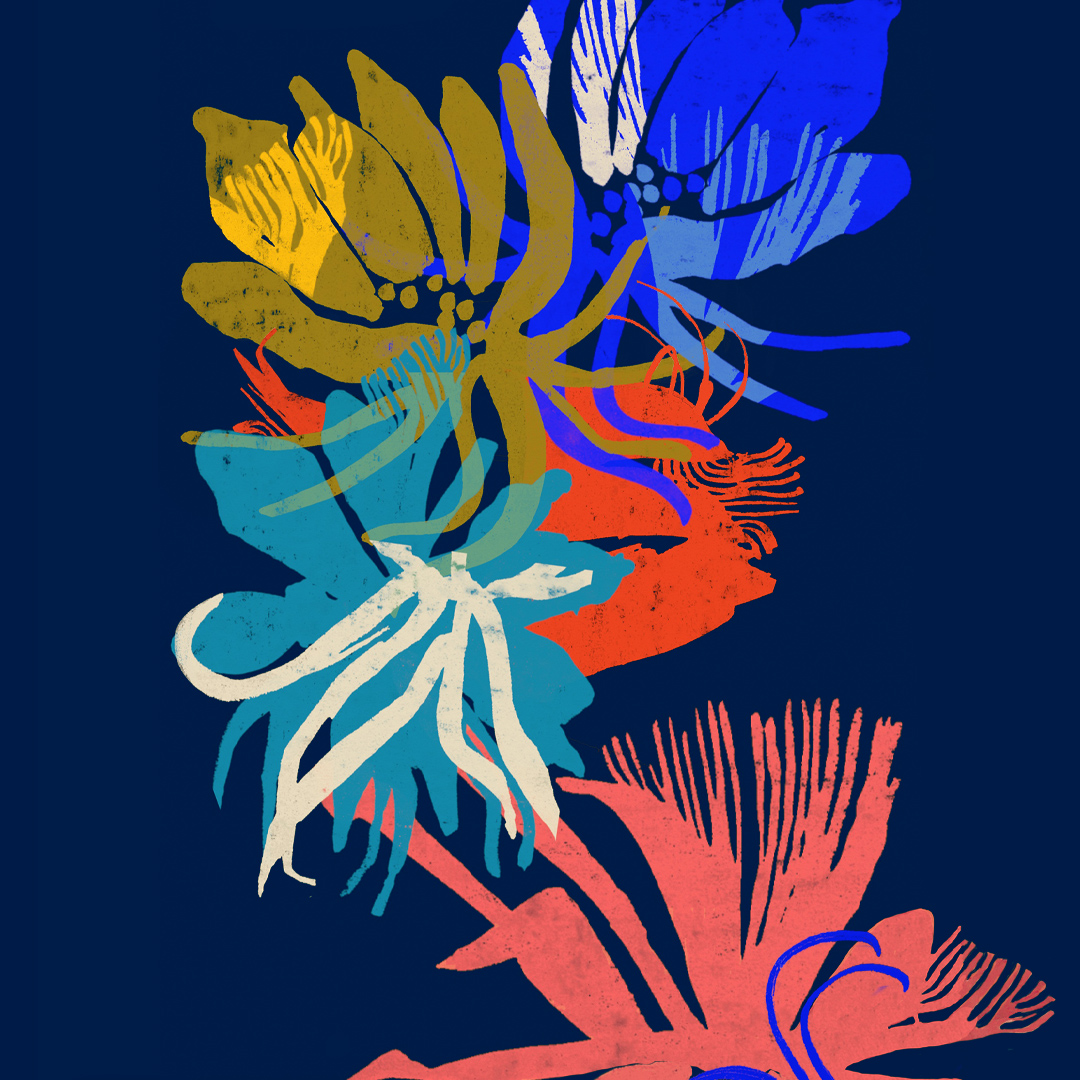Something Wrong – An Essay by Heather Abel
Heather Abel, author of The Optimistic Decade—now in paperback—shares this essay about how she came to write her debut novel.
• • •
“Class of ’36, I guess we did something wrong.”
I was in college when I first read that sentence, and its author—my grandmother—had just died. She’d been charismatic and uncompromising, equally critical of capitalism and sentimentality. In her life as a Westchester housewife/radical leftist, she’d planned protests, played tennis, and published mystery novels. When her children were grown, she moved to Manhattan, waking every morning at five to walk briskly around Central Park (mugged only a few times), spending the rest of the day writing and tending the ivy she’d planted to beautify the trees along her block. Every Saturday she organized against US atrocities in Central America.
 Days before she died in 1992, she dictated the final paragraph of her eighteenth book to my mother while attached to an IV, a blood transfusion, and oxygen. The book was, she explained, the first in a new series she planned to write. At her memorial, a week later, held in a classroom at Barnard College, her five children yelled and laughed and interrupted one another. She’d taught them to rebel against society’s mawkish ceremonies, like memorial services, as well as its unjust institutions. Her children all inherited her radical politics, and they raised us, her twelve grandchildren, in the same mode. You can be anything, they joked, as long as it’s a public defender. Interpreting this broadly, we complied.
Days before she died in 1992, she dictated the final paragraph of her eighteenth book to my mother while attached to an IV, a blood transfusion, and oxygen. The book was, she explained, the first in a new series she planned to write. At her memorial, a week later, held in a classroom at Barnard College, her five children yelled and laughed and interrupted one another. She’d taught them to rebel against society’s mawkish ceremonies, like memorial services, as well as its unjust institutions. Her children all inherited her radical politics, and they raised us, her twelve grandchildren, in the same mode. You can be anything, they joked, as long as it’s a public defender. Interpreting this broadly, we complied.
A month after the memorial, I received in the mail a thick, spiral-bound book of my grandmother’s unpublished writing, compiled by my aunt. I’m looking at it now. While most of the pages are filled with witty poems that my grandmother composed for celebrations, there is also a photocopy from her Barnard College fiftieth reunion book, one of those alumni books to which you’re invited to send in a list of your degrees and progeny along with a brief life update. My grandmother’s entry is preceded by a Barbara Graham Junge, who has “arrived at a point in which the whole world has opened up for me” and followed by a Marion Wright Knapp, who doesn’t “have much to say for or about myself other than that I’m enjoying life enormously and have given up that nonsense about being of any great value in my world.”
Between Barbara and Marion sits Miriam Borgenicht Klein, offering not an update, but a condemnation in five sentences. “Anyone our age has to stand abashed at the state of the world,” she begins. “For thirty or so years after we graduated, we felt, we may have been entitled to feel, vaguely self-congratulatory: if we preoccupied ourselves with such matters at all, we could assign to our efforts a small but perceptible effect; things were getting better. That comfortable illusion no longer seems to me possible. Put a finger anyplace on the globe today, and there is warfare, harassment, piles of dreadful weapons, appalling gaps between rich and poor.” She finishes with her biting summation, the first-person plural opening its arms to include every alumna: “Class of ’36, I guess we did something wrong.”
How did I feel when I first read this? Well, proud. Mine wasn’t your average grandma. And like her, I wanted to rail against the apathy of my college classmates. Dutifully rebellious, I’d started a chapter of the Children’s Campaign for Nuclear Disarmament when I was ten. At seventeen I’d brought busloads of other students to the Nevada desert to protest the nuclear test site.
But I was also frightened. That despair in her words? I knew it well. As a family of atheist Jews, our only god was cynicism. I’d been told my whole life: Work hard to change the world, but guess what? Despite your efforts, the world will grow increasingly fucked.
 Her words reminded me, more than anything, of a picture book I’d read as a child about an old, witchy woman who tried to rid the world of nighttime. Since I associated night with dread—of kidnappers and loneliness and nuclear war—I fully supported her attempt. With her broom, she swept frantically at the sky all night, resting victoriously when morning broke, only to be devastated when darkness fell again. I was horrified by the book’s metaphoric implications. It was my earliest introduction to futility.
Her words reminded me, more than anything, of a picture book I’d read as a child about an old, witchy woman who tried to rid the world of nighttime. Since I associated night with dread—of kidnappers and loneliness and nuclear war—I fully supported her attempt. With her broom, she swept frantically at the sky all night, resting victoriously when morning broke, only to be devastated when darkness fell again. I was horrified by the book’s metaphoric implications. It was my earliest introduction to futility.
After college, I tried peripatetically and desultorily to do something right, first by teaching gardening in housing projects in San Francisco, then by writing for an environmental newspaper in Colorado, while all around me night continued to fall; things were getting worse. Finally, conceding that I wouldn’t be doing anything right for the world, because I wanted to write a novel, I moved to Manhattan, not far from my grandmother’s block, where the ivy no longer grew.
My book began, as so many first novels must, out of a sort of rage. I wanted to write about being my grandmother’s granddaughter, about inheriting an idealism laced with disillusionment. I wanted to explain how it felt to grow up with a feverish love for Woody Guthrie’s anti-fascism and Cesar Chavez’s hunger strikes and for linking arms at a protest, for singing “We Shall Overcome,” and for that love to be tarnished, as if under dark clouds that spelled out the words DOOM and NOT GOING TO HELP.
The book began out of rage and, I’ll admit, hubris—a youthful idealism. I remember a professor telling me that no novel could be written in less than two years. I nodded and inwardly disagreed, confident that I’d finish in a year, eighteen months tops, after which I’d finally go to school to become, in the narrowest sense, a public defender.
In fact, it took me fifteen years to finish this book. I wrote other things during that decade and a half. I taught classes, raised babies. But still, intermittently for fifteen years I worked on draft after draft, each one somehow wrong.
A strange thing happened to me during this time of failure. I’d begun the book furious about the end of idealism, but as the years passed, I began to understand that when idealism ends, well, that’s when things get interesting. After all, you don’t need to simply desist when disillusioned. No, you can show up for work anyway, not with earnestness or sentimentality (my grandmother would shudder at that), but with a buoyant sense of the absurd. It’s absurd to write another draft of a book that isn’t working. But there’s beauty in this absurdity and plenty of humor, too.
How did I finally learn this? From my characters. I saw how each of them, while really trying to do something right, kept doing something wrong. Their egos got in their way, as did their lust and pride and greed, yet I was full of love for them anyway. I could forgive them more easily than I could forgive the rest of us, the wide first-person plural. I forgave Caleb, who wanted to create a back-to-nature utopia for kids, but who lied out of fear and bravado. I forgave Donnie, who, in his desire to reclaim the ranch he sold to Caleb, regurgitated the xenophobic propaganda of the mining industry. I forgave Ira, a radical journalist who shut down an entire newspaper when he stopped believing that his work was influential. And I forgave Rebecca, Ira’s daughter, who wanted so badly to rebel in a dutiful way but couldn’t figure out how to do it without being told.
You’ll have to read to find out which one of these characters gets to say my grandmother’s reproof to the class of ’36. It’s somewhere in the book, albeit in an altered form.
But her five sentences no longer frighten me as they once did. Back then, I was angry at myself and everyone else for not figuring out a way to do something unequivocally right. Now I’m beginning to understand what it means to live with an idealism conjoined with despair, with cynicism (and I have a feeling I couldn’t finish my novel until I figured this out). It means you work despite futility. You go to a protest, shout alongside strangers, and come home to read the terrible news. You plot out your new series of mystery novels while dying in a hospital bed. It’s easy, I see now, to write five lines of condemnation. We do it on Twitter every day. It’s harder to live absurdly, as my grandmother did, to drag the folding table down to Greenwich Village to collect signatures on petitions that will most certainly not remove US death squads from El Salvador, to water the ivy even though one day it, too, will die. We fail and fail. We stand abashed. We are doing something wrong, but look how beautiful we are as we keep sweeping the darkness back each night to allow one more day to arrive.
• • •
Read more about The Optimistic Decade, including an excerpt.




